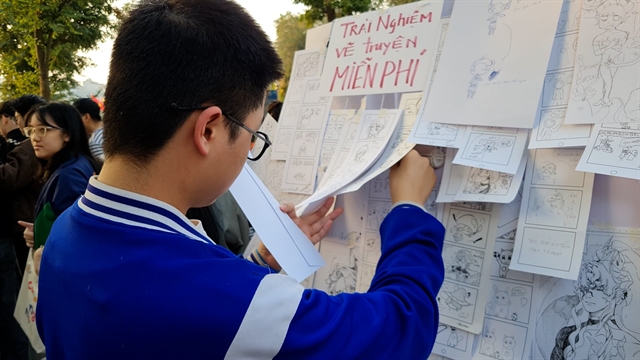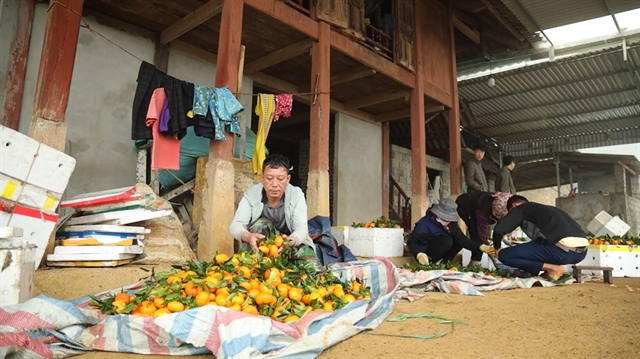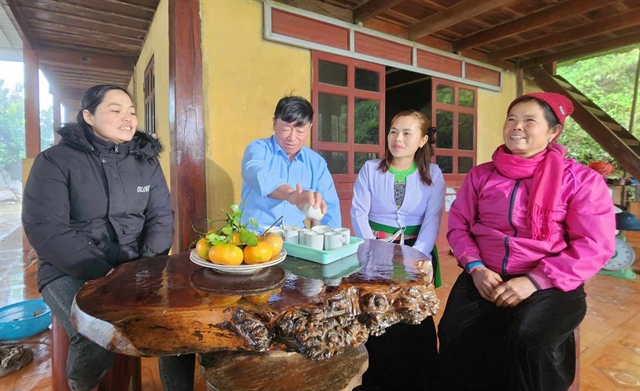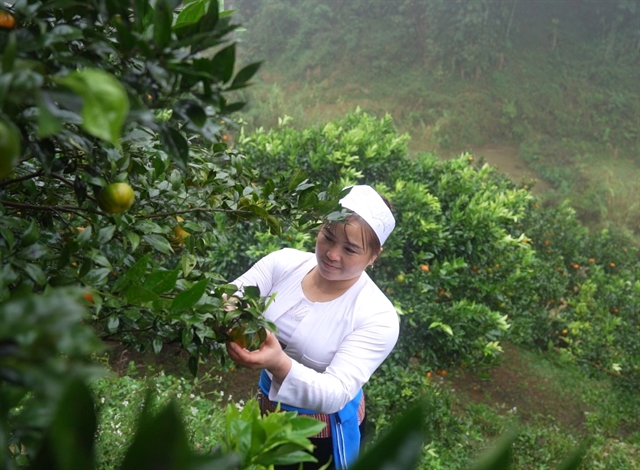 Society
Society

By Lê Việt Dũng
HÀ NỘI — Hà Văn Chanh, a Mường farmer in Vân Sơn Commune, carefully sorts oranges and puts them into boxes to make sure they can be transported smoothly.
When the fruits are snugly fitted into the boxes, merchants pick them up and bring them to marketplaces where they can be sold to wholesalers. With the income from these oranges, life has become much easier for his family.
"We grew corn and potatoes but earned a bare living. It is the oranges that have changed our lives," said Chanh.

|
| Chanh (left) and his family members sort oranges and put them into boxes. — VNS Photo Lê Việt Dũng |
People in Vân Sơn, in Tân Lạc District, Hòa Bình Province, commonly refer to oranges as "the ancient fruits" because no one knows since when they have dotted the landscape. Knowledge passed down through generations suggests that their presence could date back to far before 1950.
Nam Sơn oranges (Nam Sơn was the old name of Vân Sơn) have thin skins, juicy texture, a subtly pleasant scent, and a sweet taste. In an era where consumers are increasingly health-conscious, the chemical-free approach adopted by local farmers has become a selling point.
Chanh's is not the only family in Vân Sơn to reap the rewards of orange cultivation. Many others also see their fortunes soar after embarking on orange orchards.
Vi Thị Lan, a Thái farmer in Vân Sơn, grew rice and corn several years ago but earned merely VNĐ8 million to VNĐ10 million (US$330 to $412) a year. The income was just enough for her to make ends meet.
Having had enough of "living on a shoestring", she decided to quit rice and corn and made a new start with oranges. She enrolled in classes organised by the local government to learn orange farming techniques and receive free seedlings.
Her orchard began with a couple of hundred seedlings and a support package from the government, which comprised free fertilisers and preferential loans. Years of hard work have paid off as her orchard now boasts about 700 trees, bringing in VNĐ700 million ($28,850) annually.
"Oranges have brought not just a change in crops but a change in fortune. We have a better life now," said Lan.
From pest control to soil enrichment, every aspect of her cultivation is guided by a no-chemical commitment. The practice will not only benefit consumers but also contribute to the long-term prospect of Nam Sơn oranges.

|
| Vi Thị Lan (left), Đinh Văn Lừng (second from left), and their neighbours talking about orange crops. — VNS Photo Lê Việt Dũng |
Đinh Thị Quyết, another Mường farmer, took the preferential loans and cultivated her orchard 10 years ago. What began as a modest collection of orange trees has quickly flourished into a grove under her care, boasting more than one thousand.
"Local government's efforts to streamline procedures made it easy for us to access the funds needed for our venture," Quyết said.
Her oranges now are highly sought after by merchants. The demand is so large that sometimes she has to employ 10 farmers to pick two to three tonnes of oranges per day. With a stable income from the fruits, her family has built a new house and bought a car.

|
| Đinh Thị Quyết picking oranges from a tree in her orchard. — VNS Photo Lê Việt Dũng |
Đinh Văn Lừng, former Chairman of the People's Committee of Vân Sơn, revealed that oranges were not gaining popularity in the commune until the 1990s when Hòa Bình's Department of Science and Technology launched the scheme to propagate and spread the fruits.
"When people saw vibrant orchards and their thriving yield, they began to jump on the bandwagon," said Lừng.
The commune moved one step further in 2012 by issuing Resolution No.06 to officially make oranges "a dominant crop" locally. Orange orchards have been expanding quickly since then, now covering several hundreds of hectares. — VNS